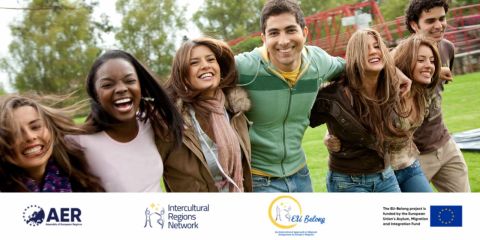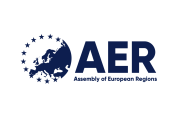
The Intercultural Regions Network and the AMIF-funded project EU-Belong provide a blueprint for shaping regions’ policies and strategies via an intercultural approach. This session explains how this approach can help regions to boost diversity, and attract and retain the talent they need to prosper in the green, digital and demographic transitions. It will address the challenges in this area and show the importance of collaboration between levels of government and the relevant stakeholders.
- Demographics (depopulation and ageing) | Social inclusion and Equality | Migration | Education and culture
- Code: 09WS241230
- Albert Borschette Conference Centre, AB-4A
Speakers
Moderator
Practical information
- When
-
Wed 09/10/2024, 14:30 - 15:30 CET
- Where
- Albert Borschette Conference Centre, AB-4A
- Type of partnership
- Partnership
- Format
- Workshop/ panel debate
- Theme
-
Regions got talent
- Languages
- English, Spanish
- Website
-
https://aer.eu/

Partner

The Assembly of European Regions
Document
Reporting
Session summary
- While assimilationism aims to eliminate cultural differences by creating a homogeneous society, both multiculturalism and interculturalism embrace diversity. The key distinction between these two approaches lies in their emphasis on interaction and social integration. Unlike multiculturalism, which may promote coexistence without active engagement, interculturalism encourages interaction and mixing among people of different origins, cultures, and backgrounds. It fosters the creation of a collective identity that values cultural pluralism, human rights, democracy, gender equality, and non-discrimination
- Since 2018, the Assembly of European Regions (AER) has been actively working on intercultural integration through participation in several AMIF-funded projects, including AMiD and Includ-EU. Additionally, AER promotes knowledge sharing among its members via the Intercultural Regions Network (IRN). The IRN serves as a platform for exchanging knowledge, resources, and best practices to foster intercultural integration at the regional level
- EU-Belong is an AMIF-funded project coordinated by the AER in collaboration with 12 partners, including 10 regional authorities in 7 European countries. Running from 2022 until 2025, it aims to improve socio-economic inclusion and migrants’ sense of belonging by developing and testing regional integration strategies that incorporate an intercultural and multi-stakeholder approach. In the context of the session, three partner regions have been presenting their initiatives, inspiring the replication of best practices in different sectors
Emilia-Romagna's International Talents Program, presented by Lara Porcialli (Project Manager at ART-ER Attivitá Ricerca Territorio), uses an intercultural approach to enhance municipalities' ability to create welcoming environments for both foreign nationals and returning Italian expats. By building a strong collaborative network among public authorities and key stakeholders, the program strengthens services like housing, job placement, and cultural integration, fostering community participation and supporting entrepreneurs, ultimately enriching the region with a diverse blend of cultures and skills
- Catalonia's ACOL Line project, introduced by Guadalupe Moreno Iturriaga (Deputy Deputy Director General of Migration and Asylum at the Ministry of Social Rights and Inclusion), integrates vulnerable migrants into the labour market by providing legal work contracts and certified training to help them obtain legal residency. Through collaboration with local authorities, private sector stakeholders, and NGOs, the project creates an environment where long-term migrants can successfully integrate into the community
- Donegal's "Black and Minority Ethnic Inclusion" strategy, explained by Andrew McNulty (Culture and Diversity Officer at Donegal's County Council), promotes cultural diversity through arts and community projects, emphasising the importance of engagement in building inclusive communities. By celebrating cultural differences, establishing mentorship programs, and prioritising trust-building, the strategy challenges the notion of migrants as a homogeneous group and fosters understanding among diverse populations
- Attendees have been active during the Q&A session, that lasted for approximately 15/20 minutes, where at least 1 question was asked to each speaker. Examples are: What type of training is provided to migrants that participate in the ACOL Line project, and how do you make sure that talent is retained in Catalonia after these training sessions? Based on your experience in Donegal, how can we raise a better discourse on migration and intercultural integration in different institutions? What have been the results of the project in Bologna and what are the kind of services offered by the Emilia-Romagna project to attract and retain talent in the region?
- Participants have been finally invited to actively take part in the next steps of the Intercultural Regions Network Initiative, by contacting the AER and interacting further with the panelists
Quotes
-
If we we share a common vision of the society we want to live in, we are on the right track
We try to connect individuals so people talk to a person instead of talking about a homogeneous group that they don’t know. We celebrate diversity and connect people on an individual level
In our ACOL Line initiative we always say: people are not illegal, they are just in an administrative position without papers
Additional links
https://aer.eu/interculturalregions/
https://internationaltalents.art-er.it/
https://serveiocupacio.gencat.cat/ca/detall/article/Treball-i-Formacio-ACOL-00001#googtrans(ca%7Cen)



